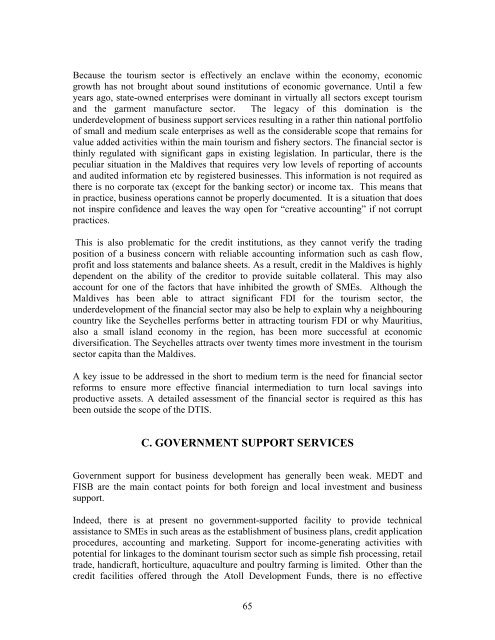DTIS, Volume I - Enhanced Integrated Framework (EIF)
DTIS, Volume I - Enhanced Integrated Framework (EIF)
DTIS, Volume I - Enhanced Integrated Framework (EIF)
Create successful ePaper yourself
Turn your PDF publications into a flip-book with our unique Google optimized e-Paper software.
Because the tourism sector is effectively an enclave within the economy, economic<br />
growth has not brought about sound institutions of economic governance. Until a few<br />
years ago, state-owned enterprises were dominant in virtually all sectors except tourism<br />
and the garment manufacture sector. The legacy of this domination is the<br />
underdevelopment of business support services resulting in a rather thin national portfolio<br />
of small and medium scale enterprises as well as the considerable scope that remains for<br />
value added activities within the main tourism and fishery sectors. The financial sector is<br />
thinly regulated with significant gaps in existing legislation. In particular, there is the<br />
peculiar situation in the Maldives that requires very low levels of reporting of accounts<br />
and audited information etc by registered businesses. This information is not required as<br />
there is no corporate tax (except for the banking sector) or income tax. This means that<br />
in practice, business operations cannot be properly documented. It is a situation that does<br />
not inspire confidence and leaves the way open for “creative accounting” if not corrupt<br />
practices.<br />
This is also problematic for the credit institutions, as they cannot verify the trading<br />
position of a business concern with reliable accounting information such as cash flow,<br />
profit and loss statements and balance sheets. As a result, credit in the Maldives is highly<br />
dependent on the ability of the creditor to provide suitable collateral. This may also<br />
account for one of the factors that have inhibited the growth of SMEs. Although the<br />
Maldives has been able to attract significant FDI for the tourism sector, the<br />
underdevelopment of the financial sector may also be help to explain why a neighbouring<br />
country like the Seychelles performs better in attracting tourism FDI or why Mauritius,<br />
also a small island economy in the region, has been more successful at economic<br />
diversification. The Seychelles attracts over twenty times more investment in the tourism<br />
sector capita than the Maldives.<br />
A key issue to be addressed in the short to medium term is the need for financial sector<br />
reforms to ensure more effective financial intermediation to turn local savings into<br />
productive assets. A detailed assessment of the financial sector is required as this has<br />
been outside the scope of the <strong>DTIS</strong>.<br />
C. GOVERNMENT SUPPORT SERVICES<br />
Government support for business development has generally been weak. MEDT and<br />
FISB are the main contact points for both foreign and local investment and business<br />
support.<br />
Indeed, there is at present no government-supported facility to provide technical<br />
assistance to SMEs in such areas as the establishment of business plans, credit application<br />
procedures, accounting and marketing. Support for income-generating activities with<br />
potential for linkages to the dominant tourism sector such as simple fish processing, retail<br />
trade, handicraft, horticulture, aquaculture and poultry farming is limited. Other than the<br />
credit facilities offered through the Atoll Development Funds, there is no effective<br />
65
















